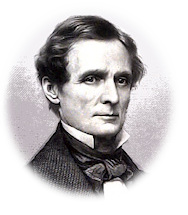“The declaration of war made against this Confederacy by Abraham Lincoln, the President of the United States, in his proclamation issued on the 15th day of the present month, rendered it necessary, in my judgment, that you should convene at the earliest practicable moment to devise the measures necessary for the defense of the country.” (Journal of the Congress of the Confederate States of America, 1861-1865)
Congress assembled to-day at noon, in compliance with the proclamation of President Davis convening an extra session. (New York Times)
On the opening day of the “extra” session of the Confederate States Provisional Congress on April 29, 1861, Jefferson Davis sent the legislators a lengthy message—in excess of 7800 words—on the reasons for the called assembly, the unstable conditions that now existed, and the needs of the new nation. Included in the message was a discussion of a primary basis for the split from the Northern states, slavery, with nearly 1300 words—about 17% of the message—devoted to that long-festering dispute between the sections.
Immediately following his discussion on slavery, Davis wrote, “the people of the Confederate States, in their conventions, determined that the wrongs which they had suffered and the evils with which they were menaced required that they should revoke the delegation of powers to the Federal Government which they had ratified in their several conventions. They consequently passed ordinances resuming all their rights as sovereign and Independent States and dissolved their connection with the other States of the Union.”
In his message to the Provisional Congress, Davis thus made a direct connection between slavery and secession. It is an important work, along with the declarations of causes by South Carolina, Mississippi, Georgia, and Texas,—and Florida’s “Lost” Draft Declaration of Causes that was undated, untitled, and never issued—and other documents, connecting secession directly to the protection of the institution of slavery and the very real power that went with it.
It’s hard to refute the words of the men who made the decisions for what turned out to be futile attempts to leave the Union.
